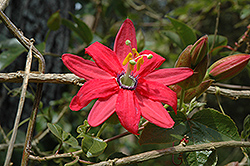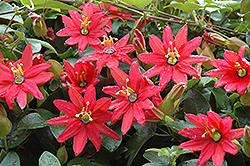It's all about ...
plants

Coral Seas Passion Flower
Passiflora 'Coral Seas'
Height: 15 feet
Spread: 30 inches
Sunlight:
![]()
![]()
Hardiness Zone: (annual)
Other Names: Coral Sea
Description:
One of the more spectacular vines for the garden; the large flowers are showy and distinctive, with their bright coral color; wonderful for covering an arbor, trellis or lattice, the flowers are individually beautiful close up
Ornamental Features
Coral Seas Passion Flower features showy lightly-scented coral-pink star-shaped flowers with deep purple eyes and white anthers at the ends of the branches in mid summer. The flowers are excellent for cutting. Its compound leaves remain dark green in colour throughout the season.
Landscape Attributes
Coral Seas Passion Flower is a multi-stemmed annual with a ground-hugging habit of growth. Its medium texture blends into the garden, but can always be balanced by a couple of finer or coarser plants for an effective composition.
This is a relatively low maintenance plant, and is best cleaned up in early spring before it resumes active growth for the season. It has no significant negative characteristics.
Coral Seas Passion Flower is recommended for the following landscape applications;
- Accent
- Hedges/Screening
- General Garden Use
Planting & Growing
Coral Seas Passion Flower will grow to be about 15 feet tall at maturity, with a spread of 30 inches. As a climbing vine, it should either be planted near a fence, trellis or other landscape structure where it can be trained to grow upwards on it, or allowed to trail off a retaining wall or slope. Although it's not a true annual, this fast-growing plant can be expected to behave as an annual in our climate if left outdoors over the winter, usually needing replacement the following year. As such, gardeners should take into consideration that it will perform differently than it would in its native habitat.
This plant does best in full sun to partial shade. It does best in average to evenly moist conditions, but will not tolerate standing water. It is not particular as to soil type, but has a definite preference for alkaline soils. It is somewhat tolerant of urban pollution. Consider applying a thick mulch around the root zone in winter to protect it in exposed locations or colder microclimates. This particular variety is an interspecific hybrid.

